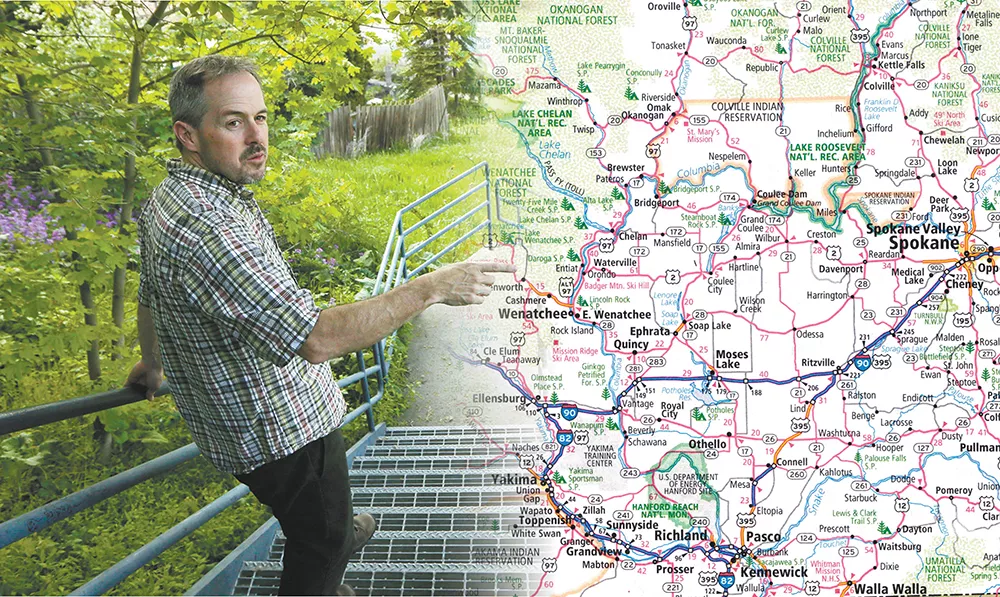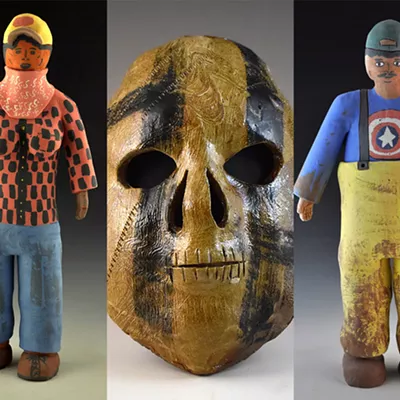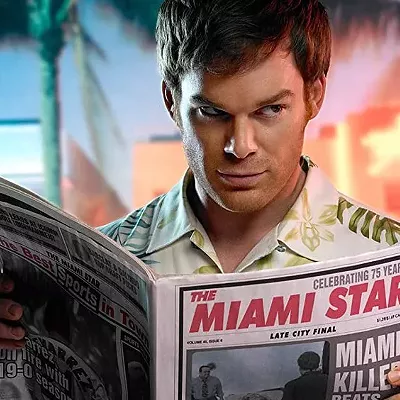
In Metaline Falls, The Postman production team supposedly paid people off when dogs were run over during the movie's shooting. I love sharing poems here; in our state, about 17 percent of children have subsidized meals; in Pend Oreille County, that number is 43 percent, highest in the state.
On one visit to Kettle Falls, I detoured because of a washout. I left home early and arrived with time to gawk at the mountains. Every event in Stevens county brought listeners with questions, people eager to share words.
Sometimes, when I told people from Seattle I was from Spokane, they'd raise an eyebrow. "Do many people over there even like poetry?" I don't know what this means exactly, but I can guess.
Endicott hosted me at their school with a potluck. There's no longer a gas pump in town. The event at the library brought in a small crowd, but we had already shared a good dinner.
Asotin is on Highway 129: pleasant weather, engaged teachers, eager students. The photos of the highway sign make me smile.
The community presentation in Pomeroy happened at the downtown senior center. They have a policy: nothing can be sold inside. I understood; we set up my display on the sidewalk; the book covers faced a sunny street.
In Dayton, elementary school classes packed an auditorium. Later in the day, I ran into a couple of the students with their mom; they showed off by reciting ("Old stone pond / frog jumps / splash!").
* * *
What I Did
I drove 42,000 miles. I flew another 16,000. I wrote editorials, talked on radio and shared poems. Most frequently: "The Song of Wandering Aengus" by William Butler Yeats, Adrienne Rich's "Aunt Jennifer's Tigers," Theodore Roethke's "My Papa's Waltz," and "We Real Cool" by Gwendolyn Brooks. Sometimes I'd talk about memorization, and my talk would go like this: "How many of you can recite a commercial or a TV show theme song? (Cue: "Nationwide is on your side.") We all carry uninvited words; I think of those words as parasites, word-ticks, syllable-leeches. I try to memorize poems all the time; sometimes — especially as I get older — this is hard, but I try because words matter. If you like poetry, then find a poem that speaks to you, that shows the world as you have known it to be — or as you'd like it to be — and invite that poem inside of you. Memorize it. If poetry isn't your thing, then find other words that matter — from Martin Luther King or the Bill of Rights. Memorize words that matter to you: invite them inside, show them the hospitality of your heart.
* * *
Walla Walla seems tipsy from wine revenue, an echo of the gentrification in Seattle, Vancouver, and other places. I spoke at The Foundry, a stunning artistic space. The librarian and I had to get out dozens of additional chairs. Several poets read with me. Words sparked. I drove home and arrived after midnight. I was OK with that.
On the way home, I went by Connell, population 5,000. (Half are inmates.) The next month I was scheduled to give a workshop at Coyote Ridge Correctional Facility and visit schools; the sign-up for the prison event was full. I waited with other visitors. A loud TV was on; the librarian came to get me, but the guard said my paperwork was lost.
I visited Ritzville — a quick I-90 sprint — a couple of times. We gathered in the library's basement and made poems.
I thought that I might fish while visiting Odessa, but the water was muddy and high. At the library, someone asked, "Why does poetry even matter?" I got that question a lot.
In Republic, an impromptu open mic at the brewery moved people to play music and read poems. One tipsy attendee recited "The Death of Sam Magee." The next morning, I met students in Curlew. We talked about favorite-sounding words. I ate at all three restaurants in town. The library has a reading area that's about 200 square feet. Seventeen of us crammed into the space. The Q&A lasted a while; I got on the road late. I was okay with that.
* * *
The Holocaust
I don't know the reason for this obsession — perhaps trying to understand that there is no limit to the awfulness of which we are capable. Probably, the election had something to do with my return to the subject. I read Tony Judt, Timothy Snyder, and Jan Gross's powerful Neighbors. In Black Earth: The Holocaust as History and Warning, Snyder writes about a teenage girl marched to the edge of a killing pit; as the bullets whizzed by, she collapsed among the dead bodies. More people are shot; the bodies pile on top of her. A soldier walks on corpses, fires into tangled limbs. The girl is hit in the hand. Dirt covers the bodies. The girl digs out. Bloody, filthy, she goes to a nearby cottage; she is turned away; she goes to another cottage where they turn her away. She goes to a third cottage where she is again turned away. The fourth cottage welcomes here, and she survives.
Snyder asks, "Who lives in the fourth cottage?"
* * *
At lunch in Omak — on break from a day with great students — I ate delicious tacos from a truck that parked near the school; driving home, I thought about words: otherness, difference, intersectionality. How many shuttered shops I'd seen in Omak and throughout the state.
Driving to Waterville nearly cost me my clean record. In Reardan, I dutifully puttered through town and then, with the open road before me, accelerated. Too soon. A sheriff walked to the driver's door, and I, in the last few weeks of my appointment, thought that I'd try to slither out of the ticket.
"Officer."
"License, insurance, registration. Do you know why I pulled you over?"
"Maybe I was speeding?"
"Thirteen over. The change to 60 isn't for another hundred yards."
"I'm sorry. I was hurrying because I'm headed to meet students to talk about poetry." Desperation. "Look (flashing him a bookmark with my sweater picture), I'm the Washington State Poet Laureate appointed by the governor to increase awareness of poetry throughout the state."
"Yeah, that's great. Please stay in your car."
In Soap Lake, the librarian panicked. She worried that no one would show up — something that happened only once in my travels — and so, she decided to move my event. I'd speak to the entire high school. I'd been preparing for a small gathering at the library, and so, when I found myself in a gymnasium, nervous about how I'd fill an hour with 350 students in bleachers, I was grateful when a kid kicked a soccer ball my way: I juggled it on my feet and thighs, balanced it on my head like a seal, and earned about 20 minutes of tuned-in attention from high school students who applauded an old guy's mad skills.
Students in Poetry Out Loud memorize poems that they recite in a scored performance. I suspect a POL state champion may soon come from the Tri-Cities; they have a good program.
The Glass Onion in Goldendale makes delicious food, but I had a scary moment at the library; frazzled from the road, my brain occasionally blundered — I'd be forgetful, have dizzy spells, get nauseated. In Goldendale, I had an episode right in the middle of reciting Yeats' "Sailing to Byzantium." I don't know what I said for a minute or so, but I'd like to think it was interesting. No one left the room.
I was in Yakima on the day after the election. At an open mic, people wept and yelled. For two years, I did my best to remember that the poet laureate is a non-partisan appointment, but on several occasions, I found this impossible. Words matter. I probably shouldn't write about this anymore.
The first Ellensburg's Poetry Prowl focused on Charles Baudelaire and began with an introduction read over the emergency broadcasting system in the downtown. I remember dozens of Banditos, a motorcycle gang, staring up inquisitively at the speakers, maybe wondering about this scandalous poet and his Flowers of Evil before they rode.
In Chelan, I bought apples, and we talked about poetry of witness. Later, in Wenatchee on Jan. 21, I'd march through town with two thousand people and read with the wonderful Claudia Castro Luna, our state's next poet laureate.
* * *
Why Poetry Matters
The horror of Snyder's story seems sharpened by the divisions of our moment. The question is complicated: who lives in the fourth cottage? My answer: Every time we open ourselves to the human imagination, every time that we try to understand an experience not our own, we stretch our empathy, our potential to open the door, to welcome a stranger. That's one of the reasons poetry matters.
* * *
I gave an award to the Jack Prelutsky in Bellingham. He played guitar and sang poems.
The Skagit River Poetry Festival is a great international gathering. Tom Robbins had me over for shrimp appetizers. I won't forget that.
The Tulalip tribe hosted me at their cultural center. We had a story circle, and I listened to David Spencer, Sr., someone who keeps the Lushootseed language alive.
In Columbia City, the African American Writers Alliance shares works at the library. They welcomed me to join them. I remember reading with Heather McHugh and the late Lucia Perillo in downtown Seattle. Two Washington geniuses.
Tacoma's "Creative Colloquy" is the sister tongue twister to "drowsy Puyallup."
In Olympia, I occasionally wore a tie; I also hung out with The Old Growth Poetry Collective (while not wearing a tie). Our governor once wrote a poem on climate change, and I wrote a poem on the 50th anniversary of Lacey, Washington.
Onalaska and Eatonville seemed like echoes of Metaline Falls and Ione. Mt. Rainier looms over everything in this part of the state.
At Mt. Pleasant elementary, the kids were full of energy: wind warnings in the Columbia Gorge had kept them cooped up. We made metaphors and later they went outside and kited about in the breeze.
The Ghost Town Reading Series might have become a misnomer: Vancouver is electric, gentrifying as it turns into a suburb of Portland.
In Longview, a man collapsed during my talk. He's OK.
I performed as warm-up act for Krist Novoselic and Robert Michael Pyle at the first Cathlamet Arts Festival; Pyle is amazing; he combines scientific and lyrical writing. Novoselic didn't really talk to me, which is OK. He seemed like a nice guy.
In Tokeland, I dined at the same hotel Robert Plant once visited; you can see photos in the lobby.
At Aberdeen Community College, no one showed.
We drank delicious tea in Shelton (and heard delicious poems).
Reading with Tess Gallagher was an honor; eating pie at the grave of Raymond Carver was an honor and a delight.
I rescheduled my visit to Forks; the gig was during the Twilight festival. I believe in the power of poetry, but I didn't want to test it against male dancers dressed up as werewolves.
In Oak Harbor, fighter planes flew low while mechanics patched a hole in one of my tires.
My reading on Orcas Island coincided with Gonzaga playing North Carolina. I didn't watch the game.
* * *
Finis
My Subaru is worn, and the divisive election has become our divisive historical moment. After speaking with thousands of people, after listening to thousands of poems, after watching many people make poems, after reading poems, talking about poems, writing about poems, obsessing poems for two years, I believe that words matter, that there are more words to be welcomed, more people to greet with the same hospitable grace that I encountered again and again throughout our state. ♦
From 2016-18, Tod Marshall, a Gonzaga University professor, served as the Washington State Poet Laureate, sponsored by Humanities Washington and Arts Washington. He visited all 39 counties in our state.
KPBX 91.1 FM Spokane Public Radio will air a series of conversations with Marshall on its show "The Bookshelf" at 6:30 pm Feb. 5-8.

















